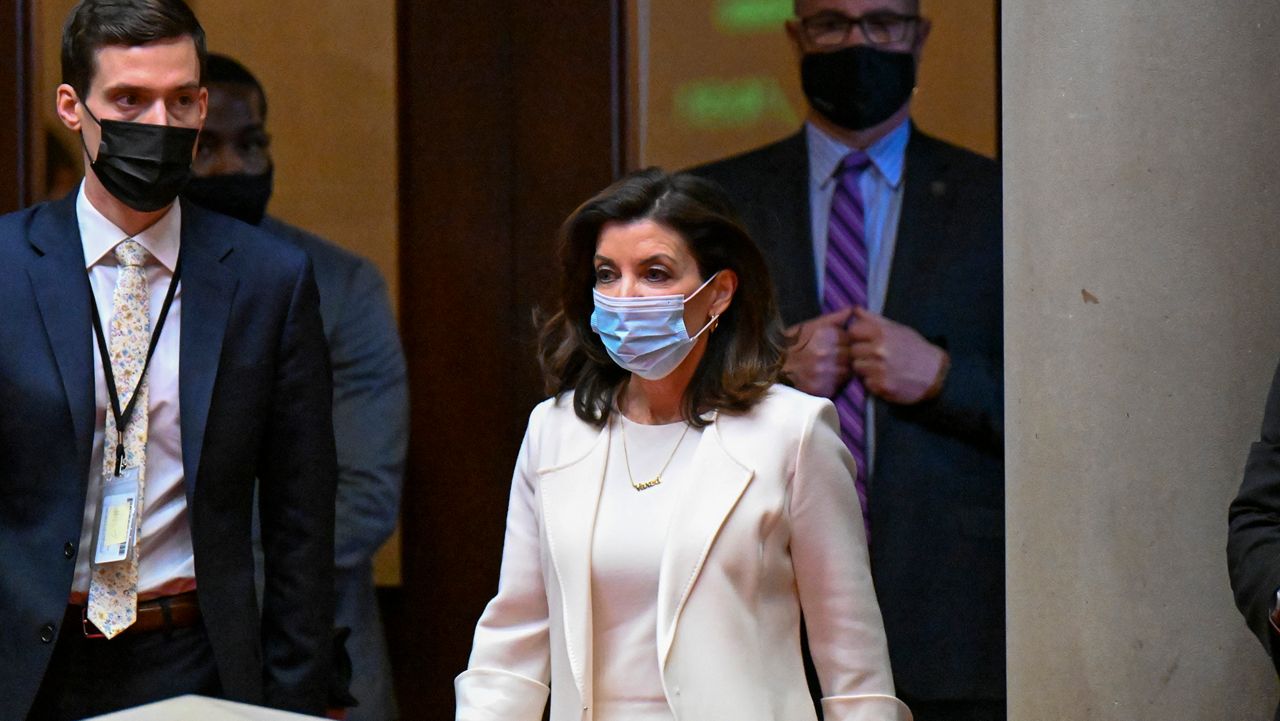David Paterson became governor at a bad time for New York state. Tasked with filling a power vacuum created by the resignation of a scandal-scarred predecessor, Paterson also had to deal with the onset of a generation-defining recession that shriveled tax revenue.
Spending had to be reduced, and allies became critics. More than a decade later, Gov. Kathy Hochul doesn't have the same kind of problem.
New York is flush with cash thanks to tax rate hikes on the wealthy, and Hochul's $216 billion spending proposal includes long-range plans for schools, infrastructure and health care. And it also could have an effect on voters when they cast their ballots later this year.
Governors in New York hold the lion's share of power over the budget process. When times are lean, it can be rough on the governor. When times are good, it can enable governors — like Hochul did Tuesday — to offer up billions of dollars in undefined spending.
"She's got the bullypulpit. She's got incumbency," said Siena College pollster Steve Greenberg. "She is the governor. It's her budget. We know she may have a different style, but the laws and the constitution are still the same."
Hochul on Tuesday outlined a budget she framed as one that addresses practical concerns for New Yorkers: pandemic and potholes included.
"This is also about meeting New Yorkers where they are now — frustrated by a persistent pandemic, anxious about rising prices of everything from milk to gas to housing, worried about whether their paycheck will be enough to make ends meet," she said.
- SEE ALSO | 5 things we've learned from the state budget
Hochul wants to increase aid to schools by more than $2 billion and boost child care by $1.4 billion. More than $1 billion would be spent on upgrading health care facilities. And she wants $2.2 billion for property tax relief. About 2 million middle and low-income home owners would be eligible for an average credit of $970.
And while rental assistance funding isn't be earmarked, she's leaving up to $2 billion in funds for pandemic recovery programs.
Though vague, Hochul indicated what will happen with the money will be in large part up to the state Legislature that can be used toward assistance for those unable to pay their rent or replenish a fund for workers not included in federal pandemic relief programs, such as undocumented New Yorkers.
"I'll work with the Legislature to identify the most impactful use of these funds in the short term — whether that's for landlords and their tenants or the hardest hurt workers and their industries or for other purposes," she said.
The budget — including property tax relief timed for the fall to providing bonsues for health care workers — comes as Hochul is running for a full term this fall. A Siena College poll released Tuesday showed her handily leading her Democratic rivals.
The Republicans running for governor, of course, were less enthusiastic.
"Hochul’s $216 billion budget demands New Yorkers dig deeper into their wallets," said U.S. Rep. Lee Zeldin. "This is one of the primary reasons why New York leads the nation in population loss percentage and why every single day more and more New Yorkers hit their breaking point and flee the state for good."
Added former Westchester County Executive Rob Astorino, “Governor Hochul's proposed budget exhibits no fiscal restraint nor the imagination needed to help reverse the decline of our state. It's a classic Albany status-quo budget - the special interests get everything they want and the taxpayers get patronized, then stuck with the bill. When I'm governor we will audit every penny of the state budget, cut the waste and redundancy, lower our debt, reduce taxes in a real way and cap spending, all of which I did as Westchester County Executive.”
New York still faces challenges. The state shed 2 million jobs in the initial weeks of the pandemic and only about two-thirds of them have returned. Many lower wage jobs in the hospitality and tourism industries haven't returned at all, especially in New York City.
Hochul's budget director, who had held the same job under Gov. Andrew Cuomo, was optimisitic richer New Yorkers would return to the city and help continue to boost revenue. Still, population loss remains an acute problem — one Hochul specifically identified in her State of the State address this month.
"It's clear that last year's tax increases on the rich really worked," said Michael Kink, an advocate and executive director of the progressive Strong Economy for All. "We've got a lot of money we can invest in schools, in colleges and universities and the budget director made it clear: rich people are't leaving."


